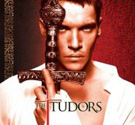The Tudors
Jane Watkins gets to grips with a series which might not teach history very well, but certainly entertains


In The History Boys, Irwin confidently states: ‘If you want to know about Hollywood, study Henry VIII.’ Unfortunately, it seems, if you want to know about Henry VIII, you shouldn’t turn to Hollywood. Several upcoming productions seem determined to ride rough-shod over our established history.
Screenwriter Michael Hirst is fast becoming to the Tudors what Andrew Davies is to classic English literature—if in doubt, add a sex scene and nudity whether they’re relevant to the plot or not or just cut out characters altogether. In 1998, he gave us a totally new view of Elizabeth I in Shekhar Kapur’s acclaimed film, and this autumn, he returns to the monarch in Elizabeth: The Golden Age (released nationwide on November 2)—which has already received decidedly mixed reviews—and also casts an eye over her father in the 10-part miniseries The Tudors, beginning on Friday, October 5 at 9pm on BBC2.
The Tudors follows the template set by Rome, and looks set to be one of those guilty pleasures you won’t admit to watching. Think Henry VIII (or Henry 8, as I read in an American magazine) meets Dallas and you’re pretty much there. Michael Hirst says: ‘The main brief was to make it history with a contemporary resonance, so it doesn’t feel like history. Here’s a guy who wants to divorce his wife for a younger woman; he’s running a big company and there are two other companies he has to compete with.’
It also boasts an impressive mainly British and Irish cast (it was filmed in Ireland) including Jonathan Rhys Meyers (Henry), Sam Neill (Cardinal Wolsey), Jeremy Northam (Thomas More), Natalie Dormer (Anne Boleyn), and Maria Doyle Kennedy (Catherine of Aragon), plus Henry Cavill, James Frain, Callum Blue, Gabrielle Anwar, and Nick Dunning. At the drama’s heart are two interlinking triangles influencing Henry’s private (Henry, Catherine and Anne) and public (Henry, More and Wolsey) lives and the struggle for ascendancy in both.
Confused by the slight, dark Rhys-Meyers playing the tall, robust, red-haired Henry? The actor isn’t worried. ‘The portrait of Henry here is different from the ‘big, fat, red-haired’ image, but it’s very accurate to the historical record. It’s a more attractive and physical Henry I’m playing.’
If you can get past that, then the show has much to tempt you. It’s sumptuously produced and well made with some excellent performances (mainly Neill and Northam), but you’ll have to ignore any history you’ve ever learnt (although given the parlous state of the history syllabus these days, that won’t be difficult for the younger end of the audience), as it’s not particularly concerned with sticking to the facts. As in Rome, some characters are dropped or conflated into a composite character. And there’s sex and slaughter aplenty. Indeed, one reviewer was outraged that characters took their clothes off—not from prudery, but because it would have been far too cold to do so! And like Rome, it’s trashy, but strangely addictive.
Sign up for the Country Life Newsletter
Exquisite houses, the beauty of Nature, and how to get the most from your life, straight to your inbox.
Country Life is unlike any other magazine: the only glossy weekly on the newsstand and the only magazine that has been guest-edited by HRH The King not once, but twice. It is a celebration of modern rural life and all its diverse joys and pleasures — that was first published in Queen Victoria's Diamond Jubilee year. Our eclectic mixture of witty and informative content — from the most up-to-date property news and commentary and a coveted glimpse inside some of the UK's best houses and gardens, to gardening, the arts and interior design, written by experts in their field — still cannot be found in print or online, anywhere else.
-
 Everything you need to know about private jet travel and 10 rules to fly by
Everything you need to know about private jet travel and 10 rules to fly byDespite the monetary and environmental cost, the UK can now claim to be the private jet capital of Europe.
By Simon Mills
-
 'I'd willingly give a year of my life for a fortnight there': The green dream that is the garden of Derreen
'I'd willingly give a year of my life for a fortnight there': The green dream that is the garden of DerreenExotic woods, labyrinths of narrow, mossy paths and thousands of tree ferns make this an internationally important garden, writes Charles Quest-Ritson. Photographs by Jonathan Hession.
By Charles Quest-Ritson